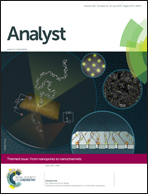Theoretical analysis of ion conductance and gating transitions in the OpdK (OccK1) channel
Abstract
Electrophysiological measurements have shown that the channel protein OpdK, also known as OccK1, from Pseudomonas aeruginosa shows three conductance substates. Although several experimental studies have been performed, a description of the gating transitions at the molecular level remains elusive. In the present investigation, molecular dynamics simulations have been employed to elucidate the conductance and gating properties of the OpdK channel and loop deletion mutant thereof. Our results suggest that switching between different substates are coupled to conformational changes in the constriction loop L7 which is in accord with the experimental results. Unbiased simulations at different temperatures are analyzed and residues R284 and F291 on loop L7 have been identified to be key in the gating transitions. A plausible mechanism of gating for this channel is discussed. The obtained molecular level description might have important implications for understanding the functional properties of OpdK channel in vitro as well as within a cellular environment.

- This article is part of the themed collection: From nanopores to nanochannels

 Please wait while we load your content...
Please wait while we load your content...